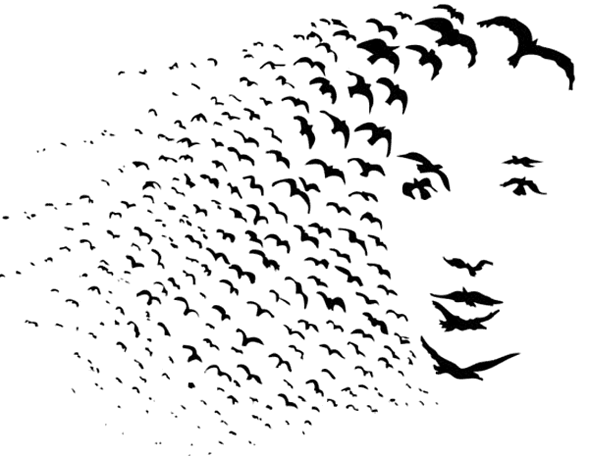Risk of being Open and Transparent with Old and New Enemies

“The Ants 27:88 “You see the mountains and think them firmly fixed…” The Spider 29:41…but truly the flimsiest of houses is the Spider’s house…16:68 “…taught the Bee to build its cells in hills, on trees…” – The Qur’an
In 2015, a year before the 2016 U.S. Election, I wrote an open letter, Dear Future Madam President or Mr. President, The Clock is Ticking! In it, I pointed out that there is a risk to being open and transparent. The success of preemptive measures is dependent on clandestine operations. It is NOT in being open and transparent to the enemy.
I pointed out that for all the discussions made at yet another Defense One Submit in 2015, they were to no avail. A year earlier, intrusion on the grounds and security breaches were reported at the White House. How is Washington to protect Air Force One when it is unable to secure its House on the ground?
The summit’s theme was ludicrous, “The Age of Everything: Setting National Security Priorities in an Era of Evolving Threats.” Why not call it, “US Security tells all.” But there is a quagmire. The public demands both transparency and security. Recall, the NSAs Director of Cybersecurity stated, “The threat demands it. The nation deserves it.” The problem is that security and transparency are incompatible.
Transparency hinders counterintelligence and poses risks. James R. Clapper, former Director of National Intelligence noted, “This whole discussion is prompted in being more open and transparent” and worth the risk. Sir, tell that to the men and women risking their lives. Seems contradictory coming from a person in charge of “intelligence,” or was Clapper simply telling the audience at the Defense One Summit what they wanted to hear? Clapper added, the “nature of intelligence is to deal with uncertainty.” Sir, the nature of intelligence is to secure it – not to open and disclose it.
We learned about an enemy who is sophisticated, patient, disciplined, and lethal. – Preface to 9/11 Commission Report.
Good vs Bad Intel: When to Act
In the aftermath of September 11th 2001, investigations pointed to Saudi Arabia but few questioned the idea of taking the fight to Iraq. The Benghazi attack of September 11,2012 may have supported skepticism. Two attacks, exactly 11 years apart. What are the odds? Did the U.S. not question the reporting again? The outcome was not only unfortunate and tragic but preventable. Also troubling was the continued disregard of the recommendations in The 9/11 Commission Report.
In the chapter, “Counterterrorism Evolves,” the Report states that “The goal to ‘prevent terrorism’ requires a dramatic shift in emphasis from a reactive capability to highly functioning intelligence capability…clear strategic analysis and direction.” How is this goal accomplished? It is vital to differentiate between good vs bad Intel.
Dangerous and deadly outcomes result when one fails to act on good Intel or acts on bad Intel. Let’s not forget Paul Wolfowitz’s words in explaining the attack of September 11, 2001. It appears, they did not “question the reporting about Al Qaeda.” Then in 2003, the U.S. reportedly acted on bad Intel invading Iraq. Others point to a President’s personal agenda and of special interests war profiteering (oil).
ISIS did not replace Al Qaeda but supplemented it. In the course of three decades, two past U.S. Presidents’ foreign policies were directly responsible for cultivating two terrorist leaders. In the last decade, two U.S. Presidents took credit for the deadly capture of these same two terrorist leaders. Mission Accomplished.
Members of the “Gang of Eight” Congressional Representatives appeared surprised and offended in not being advised of the recent planned attack in Syria. But this wasn’t the first time Congress was kept out of the Intel loop. Last December, a meeting was held on Intelligence Community Accountability.
On torture and interrogations, John Rizzo, Former Acting General Counsel of the CIA acknowledged, “We didn’t tell enough people what we were doing…including the full intel community, “Gang of Eight.” Rizzo argued that had they been more forthcoming in disclosing, “This is what “waterboarding” is at least they couldn’t have said… [we didn’t disclose it]. However in being open and transparent with Congress, aren’t the risks of leaks a legitimate concern especially when planning surprise attacks or taking preemptive measures to deter them?
Ripe for Execution
In The 9/11 Commission Report, the last chapter, “How To Do It?” references Thomas Schelling’s words over 40 years ago of the Pearl Harbor incident, “Surprise, when it happens to a government…includes neglect of responsibility, but also responsibility so poorly defined or so ambiguously delegated that action gets lost.” Or, I might add, when the action results in overkill.
U.S. policy in the use of drones has proven an expensive strategy. Says Michael J. Boyle, as a tactical maneuver, “the Obama administration’s growing reliance on drone strikes has adverse strategic effects that have not been properly weighed against the tactical gains associated with killing terrorists.” As Machiavelli words note, concealing an enterprise until it is ripe for execution is one strategy.
Misdirection is another. No nation knows and practices the art of misdirection better than Russia. But there are others who have attempted and at times succeeded, like the U.S. use of sanctions as a form of distraction. There’s a funny thing about the word sanction as it has no clear cut definition. It means both restriction and authorization. Between leaders private meetings the wording may be made clear, but on the frontlines actions supersede words.
Think about it. As Obama threatened Russia with sanctions, U.S. Special Forces were sanctioned in Pakistan. As Trump imposed sanctions on Iran, U.S. Special Forces were sanctioned in Syria. It appears U.S. enterprises of capturing the enemies succeeded. May explain why the U.S. President surprisingly ordered withdrawal of troops from Syria “prematurely.” I imagine he wanted to protect them from in the aftermath of the planned operation. An operation not shared with Congress.
Congress insisting on transparency and requiring national security to disclose its tactics or strategic long term plans is counterproductive. National security is put in a position of reconciling transparency (policy) with being clandestine (use of force). Yet, it is important to remember that in the use of force, blowback can and has occurred.
U.S., once again, election year is upon you and I restate, Dear Future Madam President or Mr. President, The Clock is Ticking! Has U.S. engagement in Syria given rise to an old enemy promoting uncertainty in an already unstable East?
The West has enemies who understand it better than the Western powers understand the enemies. The enemies understood and saw an opportunity in Europe’s porous borders. The enemies did not lift a finger to have Europe and the U.S. open its doors to refugees. Now, the enemies can conveniently hide in plain sight as it plans attacks amidst an already unstable U.S. simultaneously promoting uncertainty.
Uncertainty vs Instability
As a child I caught a glimpse of life’s uncertainties- brutality and mendacity of man. As an adult, I learned of governments and man and his “state of nature.” It is in my nature to intelligently deal with the instabilities of life. It is in my nature to bestow no mercy upon the beasts of past and present.
“No beast so fierce but knows some touch of pity. But I know none, and therefore am no beast.” – Shakespeare
Uncertainty is predominant in the East and West. From the 11th Century Persian mathematician Omar Khayyám to the current Australian economist Robert Dixon, we may gain perspective.
Dixon remarked, “Uncertainty is present in the decision-making process, not so much because there is a future as that there is, and will be, a past…” Khayyám, through his poetry, conveys a similar thought, “The Moving Finger Writes; and, having writ, Moves on: nor all your Piety nor Wit Shall lure it back to cancel half a Line…”
As one President draws red lines in the sands of Syria, another draws blood on the same sands referring to the enemy as a dog. But what does a President know of the “dogs of war?” Nothing, unless he has walked and crawled on bloody soil. Yet, there are some who know them intimately.
“Cry ‘Havoc!’ and let slip the dogs of war.” – Shakespeare
Frederick Forsyth, British author of “The Day of the Jackal”, “The Fourth Protocol,” and “The Odessa File” is quite familiar with the subject. His book “The Dogs of War” notes that Forsyth “is treating here in fictional form a way of life he has experienced at first hand. In his African assignments for the BBC during the Biafran war, Mr. Forsyth came to know intimately mercenaries from many nations.” Forsyth’s books paint a vivid picture of the bestiality of war. Unlike the U.K., the U.S. having presence across the globe needs to be reminded that they need to “sleep in the same bed they made,” unstable and bloody.
Nature of Intelligence and Brutality
Certainty or security is not conducive to this world. Stability, though fleeting, offers a false sense of security. The U.S. unable to capture and retain the free bird of stability turns its eye to the illusiveness of certainty. Clapper argues that the “nature of intelligence is to deal with uncertainty.” Is Clapper confused or is it in his nature to lie?
I propose another argument: Man by his very nature is brutish. And yet he can be intelligent. What supports my argument? Thomas Hobbes’ Leviathan could attest to man’s brutality. Protagoras words may attest to my calculation that man is both, lest you forget that “man is a measure of all things.” But these are men of a different time, long past. I recall Hobbes’ assertion that without government, man is in a “state of nature.” Today, however, man is with government and still in a “state of nature.” What is my argument of modern times?
The nature of intelligence is to deal with instability. The nature of brutality is to deal with uncertainty. The U.S. gives credence to my argument:American men are known to deal with uncertainty in their life with brutality as their use of weapons demonstrates. American intelligence agencies deal with uncertainty with brutality as their use of interrogation tactics on terrorists suspects demonstrate.
Man’s certainty of brutality and intelligence, be they adorned with silk of the East or West, be they defended with the sword or arsenal, or be they honored with heads or medals, fight a losing battle. How? U.S terrorism in gun shootings attests to its policies on gun control. The terrorism of the East spreading across the globe attests to U.S. failed policies on foreign soil bearing the fruit of instability.
The West attempted conquest of the “certainty” of freedom and security by way of deception will attract more birds to swarm; only the nature of these birds are not that of doves and will bring their flock to your soil.
For “If one Prophet deceive another, what certainty is there of knowing the will of God, by other way than that of Reason?” And no amount of intelligence will help you deal with the brutal risks of uncertainty. It’s in your nature.
